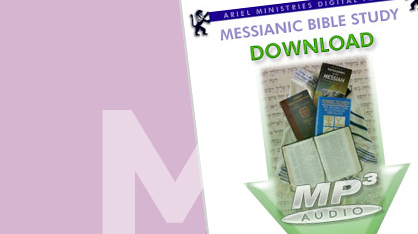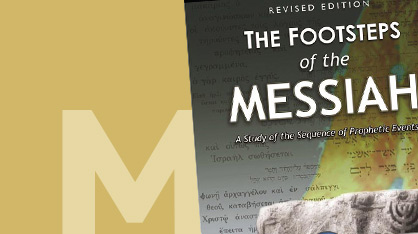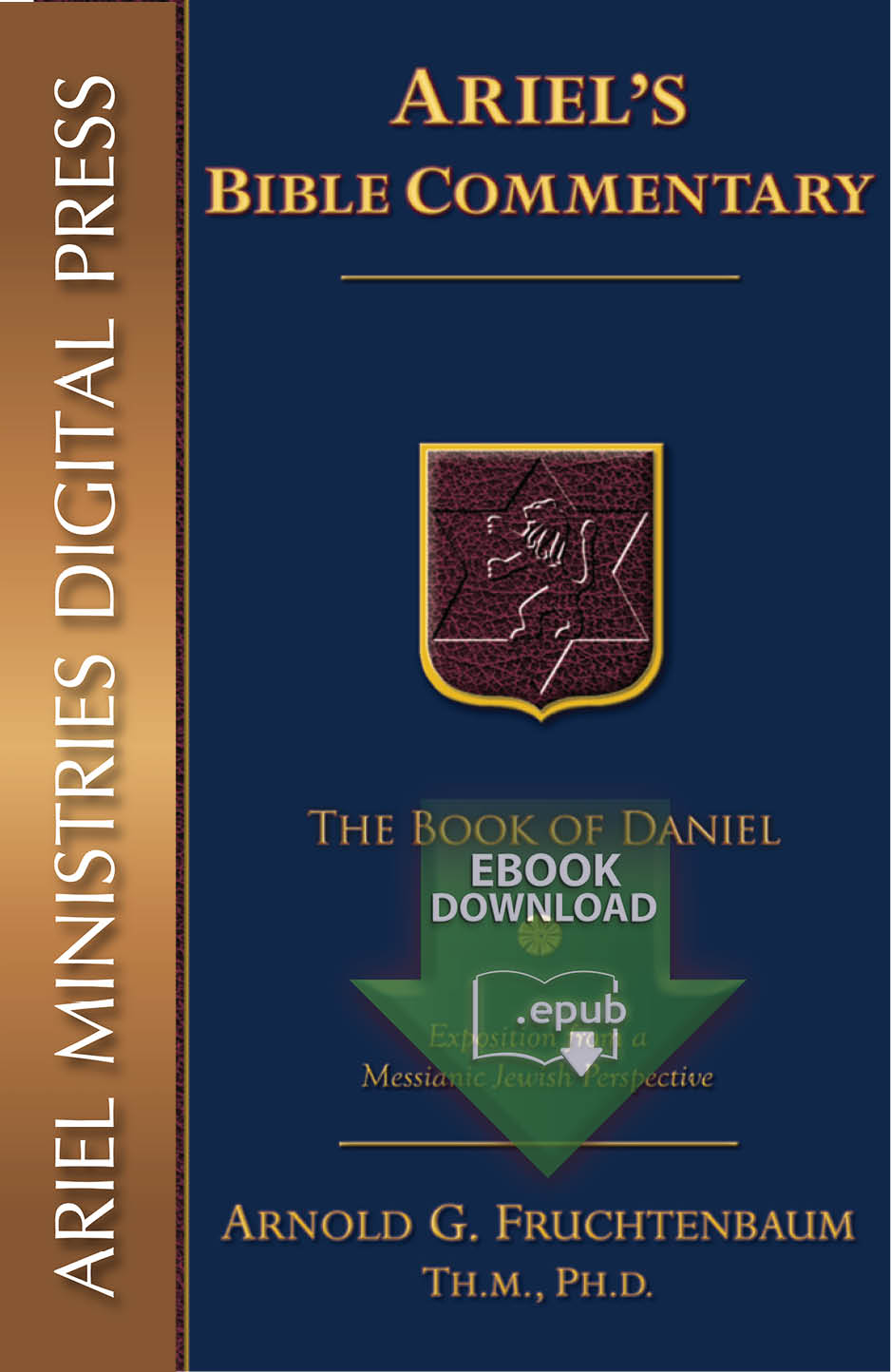
Commentary Series: The Book of Daniel (epub)
by Dr. Arnold G. Fruchtenbaum
The book of Daniel, though one of the most intriguing prophetic texts in the Hebrew Scriptures, presents a comprehensive and chronological prophetic picture of the broad sweep of history. In this detailed exposition, Dr. Fruchtenbaum offers a fresh and coherent understanding of the prophecies in the book of Daniel. He examines the historical and cultural context of the book, its literary structure, and its theological themes. He explains how these prophecies relate to the history of Israel, especially in the context of the times of the Gentiles. He addresses alleged historical inaccuracies, considers the rabbinic interpretation as well as apocryphal additions, and offers a unique and convincing interpretation of Daniel’s seventy sevens. Numerous charts, tables, and maps give additional clarity to the text.
Whether you are a student of the Scriptures, a pastor, or a layperson seeking to deepen your understanding of biblical prophecy, this commentary will provide a clear and coherent exposition of the book of Daniel from a Messianic Jewish perspective, illuminating the prophetic message of this important book and its relevance for the history of this world.
- Ebook for Kindle and Epub readers
- 630 pages
- ISBN: 978-1-958552-05-6
- Approximate download file size is 5.3 MB
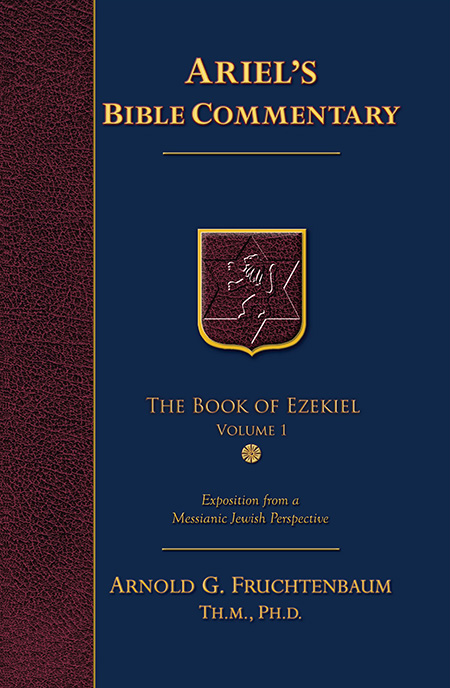
Commentary Series: The Book of Ezekiel - Vol. 1 (1 - 32)
by Dr. Arnold G. Fruchtenbaum
The book of Ezekiel stands as one of the most enigmatic and captivating texts of the Hebrew Bible, filled with vivid visions of whirling wheels, dry bones, and divine judgment. Yet, for many readers, these complex images present a barrier to understanding, leaving them overwhelmed and disconnected from the book’s profound spiritual and literary depth.
In this comprehensive verse-by-verse commentary, Messianic Jewish Bible scholar Dr. Arnold G. Fruchtenbaum expertly guides readers through the first thirty-two chapters of Ezekiel, demystifying its rich content with scholarly insight. Drawing from both Jewish rabbinic sources and Christian academic works, Dr. Fruchtenbaum offers a balanced, in-depth perspective that sheds light on Ezekiel’s prophetic messages.
Whether exploring the prophecies foreseeing the destruction of the First Temple or those regarding Israel’s future restoration, this commentary provides clarity and understanding for anyone willing to delve into this often-overlooked book.
- Hardcover: 673 pages
- ISBN: 978-1-958552-13-1
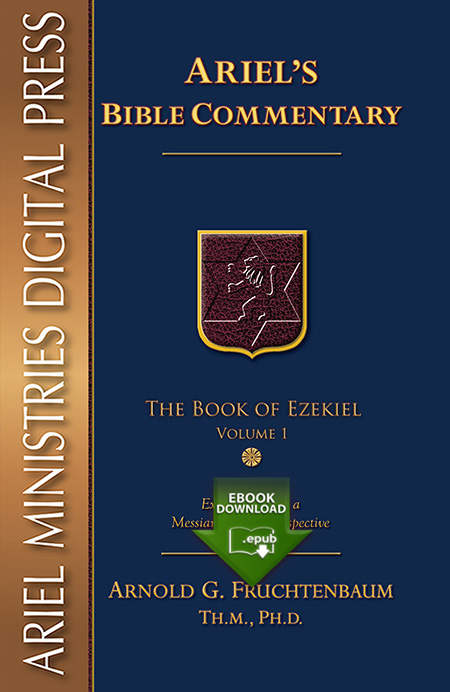
Commentary Series: The Book of Ezekiel - Vol. 1 (epub)
by Dr. Arnold G. Fruchtenbaum
The book of Ezekiel stands as one of the most enigmatic and captivating texts of the Hebrew Bible, filled with vivid visions of whirling wheels, dry bones, and divine judgment. Yet, for many readers, these complex images present a barrier to understanding, leaving them overwhelmed and disconnected from the book’s profound spiritual and literary depth.
In this comprehensive verse-by-verse commentary on the Book of Ezekiel, Messianic Jewish Bible scholar Dr. Arnold G. Fruchtenbaum expertly guides readers through the first thirty-two chapters of Ezekiel, demystifying its rich content with scholarly insight. Drawing from both Jewish rabbinic sources and Christian academic works, Dr. Fruchtenbaum offers a balanced, in-depth perspective that sheds light on Ezekiel’s prophetic messages.
Whether exploring the prophecies foreseeing the destruction of the First Temple or those regarding Israel’s future restoration, this commentary provides clarity and understanding for anyone willing to delve into this often-overlooked book.
- 673 pages
- Approximate download file size is 4 MB
- ISBN: 978-1-958552-14-8
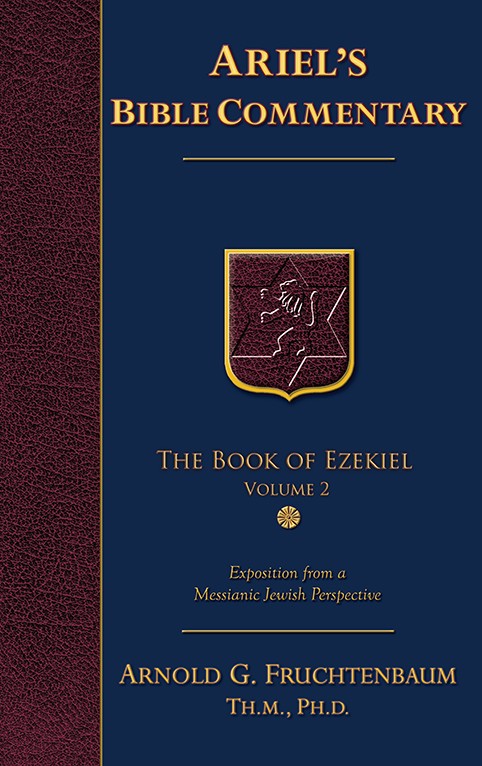
Commentary Series: The Book of Ezekiel - Vol. 2 (33 - 48)
by Dr. Arnold G. Fruchtenbaum
This volume concludes Dr. Arnold G. Fruchtenbaum’s comprehensive two-part commentary on the book of Ezekiel.
While the initial chapters of Ezekiel focus on impending judgment, this volume shifts to the theme of future restoration. Here, Ezekiel’s vision unfolds with a message of profound hope for Israel: A regathered nation, divinely restored, will witness the establishment of a new Temple and a new form of worship in the land promised to their forefathers. The people of Israel will finally experience enduring peace and security, as their Messiah—the Lover of their souls—reigns from the throne of David in Jerusalem.
- Hardcover: 439 pages
- ISBN: 978-1-958552-15-5
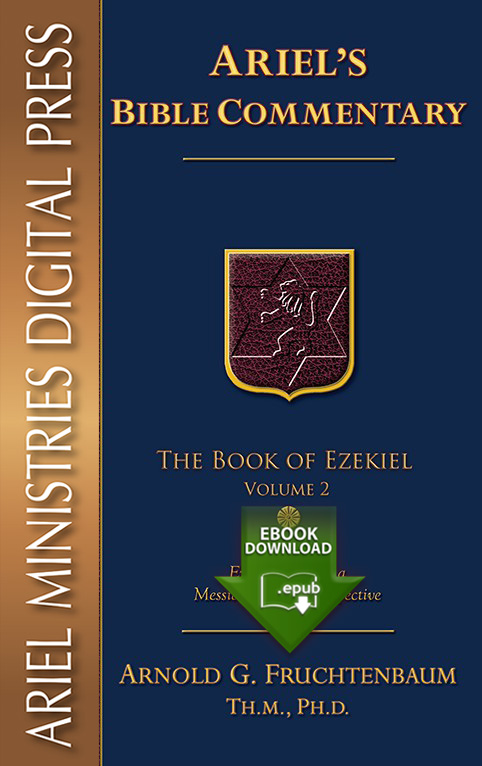
Commentary Series: The Book of Ezekiel - Vol. 2 (Epub)
by Dr. Arnold G. Fruchtenbaum
This volume concludes Dr. Arnold G. Fruchtenbaum’s comprehensive two-part commentary on the book of Ezekiel.
While the initial chapters of Ezekiel focus on impending judgment, this volume shifts to the theme of future restoration. Here, Ezekiel’s vision unfolds with a message of profound hope for Israel: A regathered nation, divinely restored, will witness the establishment of a new Temple and a new form of worship in the land promised to their forefathers. The people of Israel will finally experience enduring peace and security, as their Messiah—the Lover of their souls—reigns from the throne of David in Jerusalem.
- Hardcover: 439 page
- Approximate download file size is 6 MB
- ISBN: 978-1-958552-15-5
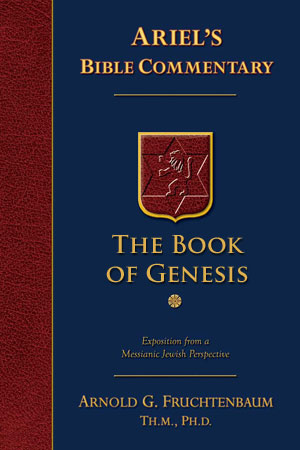
Commentary Series: The Book of Genesis
by Dr. Arnold G. Fruchtenbaum
In structure, the Book of Genesis is a series of eleven family histories, or toldots, compiled and edited by Moses. Throughout the vivid detail provided in Genesis, Dr. Fruchtenbaum's exegesis allows God's Word to make its own case for a literal interpretation of the Bible. Dr. Fruchtenbaum's grammatical, historical-geographical approach to Scriptures from a Jewish perspective provides the reader an exciting new way to grasp and unlock the richness of this book of the beginnings of all nations, and in particular, the beginning of the nation of Israel.
For instance, Dr. Fruchtenbaum brings to life the many genealogies in Genesis as they relate to God's promises of a Messiah. Genesis makes clear the Messiah would one day come out of Israel to redeem the nation of Israel and to bless all the families of the earth.
Important to understanding one's relationship to God, Genesis presents four of God's eight covenants. Three are covenants God made with humanity in general, and these are associated with the familiar stories of Creation, the Fall, and the Flood. The fourth one, an unconditional covenant with Abraham, is the beginning of the story of the nation of Israel, based on God's promises of descendants and Land to Abraham, Isaac, and Jacob. The account of the nation of Israel that Moses begins in Genesis, he then continues in the four books of the Bible that follow.
- Hardcover: 752 pages
- ISBN: 978-1-935174-00-4
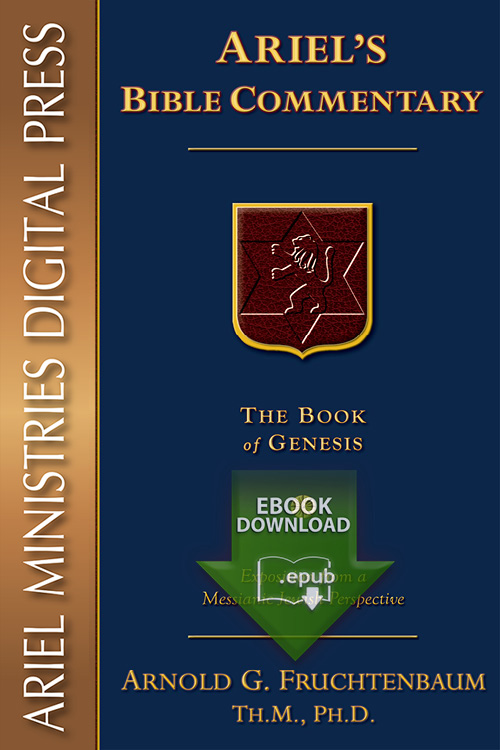
Commentary Series: The Book of Genesis
by Dr. Arnold Fruchtenbaum
In structure, the Book of Genesis is a series of eleven family histories, or toldots, compiled and edited by Moses. Throughout the vivid detail provided in Genesis, Dr. Fruchtenbaum's exegesis allows God's Word to make its own case for a literal interpretation of the Bible. Dr. Fruchtenbaum's grammatical, historical-geographical approach to Scriptures from a Jewish perspective provides the reader an exciting new way to grasp and unlock the richness of this book of the beginnings of all nations, and in particular, the beginning of the nation of Israel.
For instance, Dr. Fruchtenbaum brings to life the many genealogies in Genesis as they relate to God's promises of a Messiah. Genesis makes clear the Messiah would one day come out of Israel to redeem the nation of Israel and to bless all the families of the earth.
Important to understanding one's relationship to God, Genesis presents four of God's eight covenants. Three are covenants God made with humanity in general, and these are associated with the familiar stories of Creation, the Fall, and the Flood. The fourth one, an unconditional covenant with Abraham, is the beginning of the story of the nation of Israel, based on God's promises of descendants and Land to Abraham, Isaac, and Jacob. The account of the nation of Israel that Moses begins in Genesis, he then continues in the four books of the Bible that follow.
- Ebook for Kindle and Epub readers
- 752 pages
- Approximate download file size is 2.06 MB
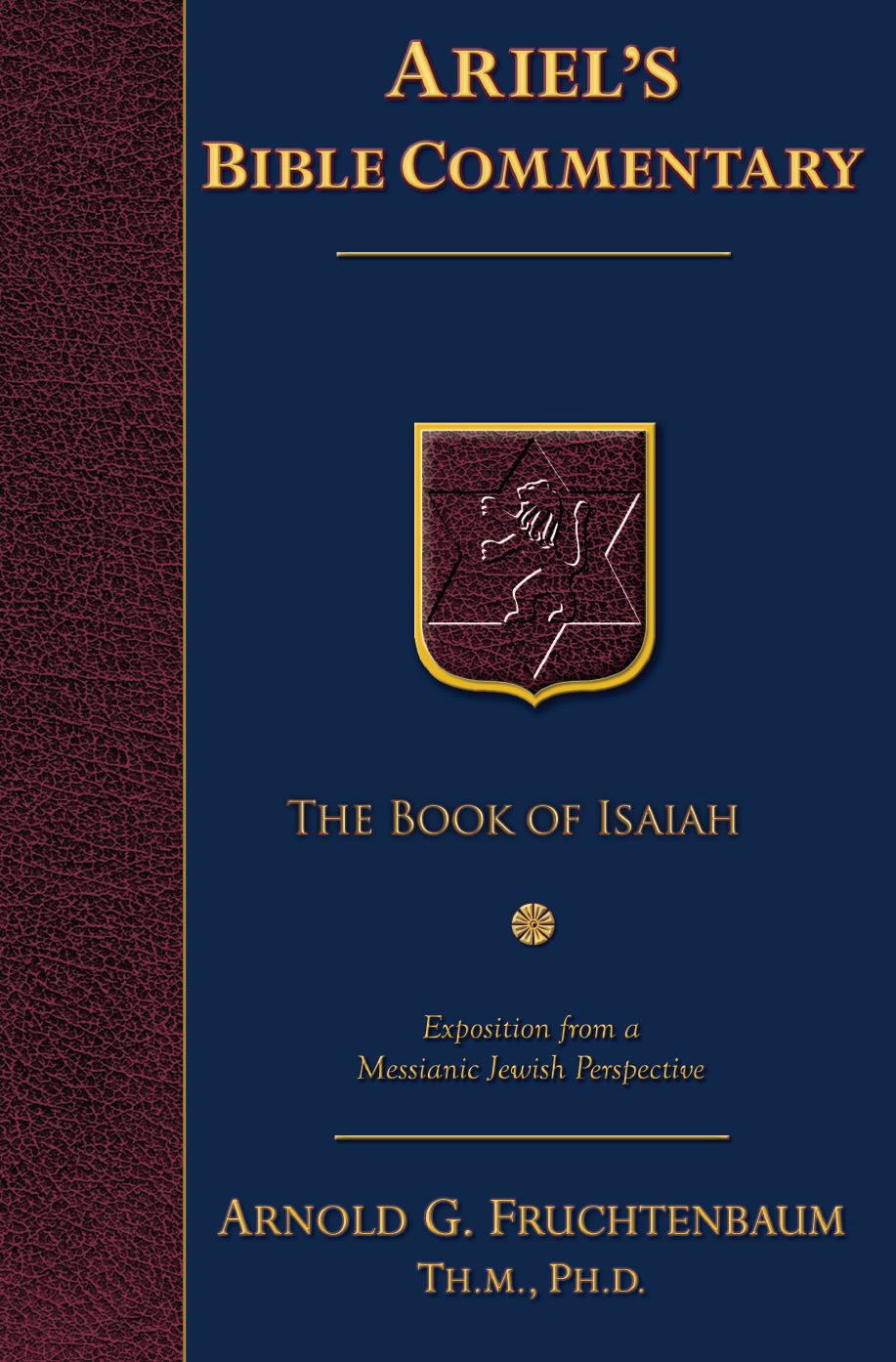
Commentary Series: The Book of Isaiah
by Dr. Arnold G. Fruchtenbaum
The book of Isaiah is one of the most popular and fascinating books of the Hebrew Scriptures. Its author, Isaiah, is often called the prince of prophets, for he wrote with extraordinary beauty and imagery. His work is full of facts about the society of Israel around the year 700 B.C. Its chief value, however, lies in the abundance of prophecy, ranging from near to far prophecies and everything in between. Like no other author before him, Dr. Arnold G. Fruchtenbaum has dissected the various levels of prophecy and provided a meticulous exegesis of the text. His theological orientation remains strictly dispensational with a pretribulational view of the rapture and is presented from a Messianic Jewish perspective. In his work, the author has consulted the great rabbis of the past and reproduced their viewpoints wherever appropriate. The result is a fascinating commentary that leaves no doubt that Isaiah foresaw both the first and second coming of the Jewish Messiah, as well as the final restoration of Israel in preparation for the Messianic kingdom.
- Hardcover: 872 pages
- ISBN:978-1-951059-87-3
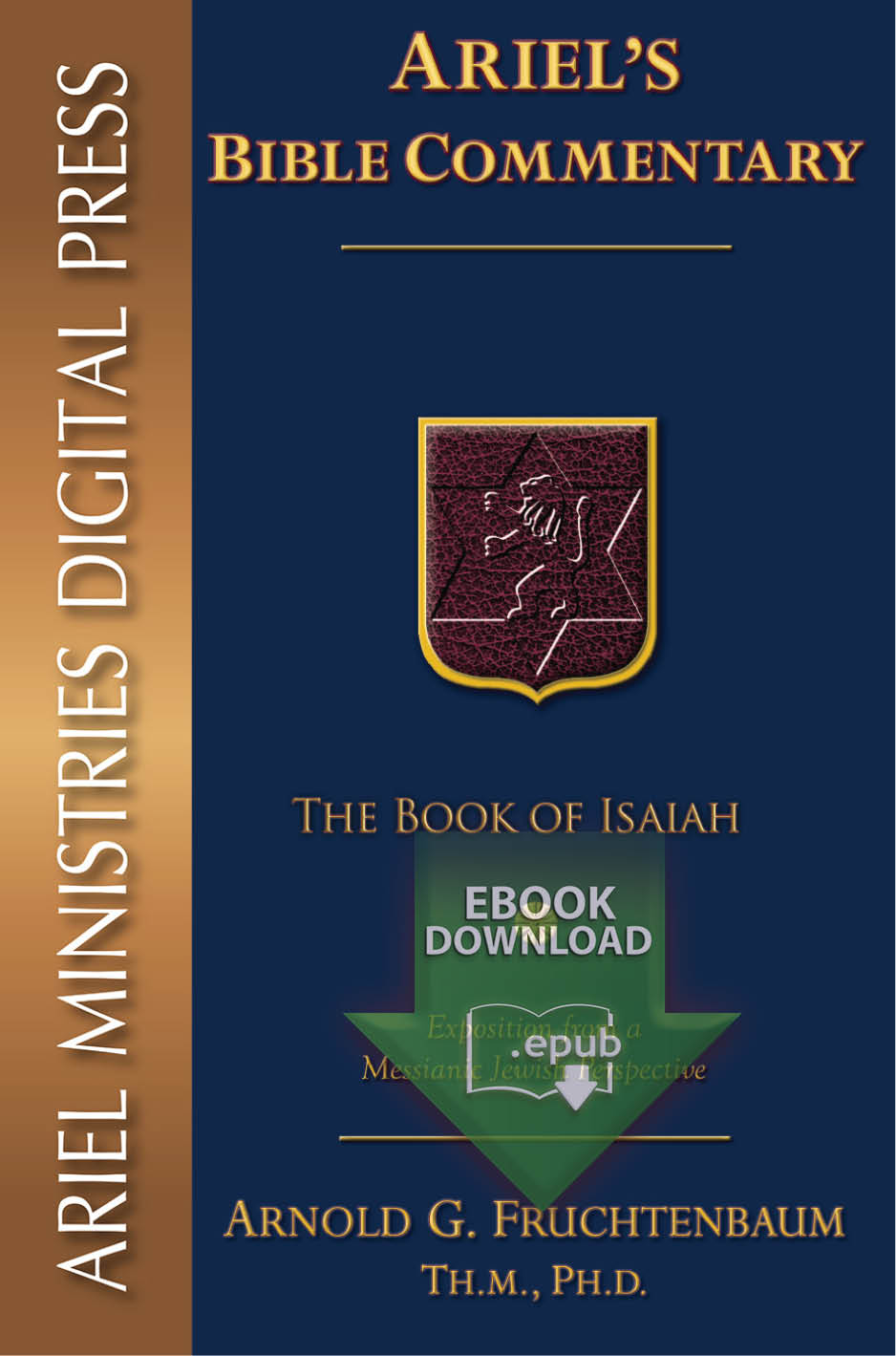
Commentary Series: The Book of Isaiah
by Dr. Arnold G. Fruchtenbaum
The book of Isaiah is one of the most popular and fascinating books of the Hebrew Scriptures. Its author, Isaiah, is often called the prince of prophets, for he wrote with extraordinary beauty and imagery. His work is full of facts about the society of Israel around the year 700 B.C. Its chief value, however, lies in the abundance of prophecy, ranging from near to far prophecies and everything in between. Like no other author before him, Dr. Arnold G. Fruchtenbaum has dissected the various levels of prophecy and provided a meticulous exegesis of the text.
His theological orientation remains strictly dispensational with a pretribulational view of the rapture and is presented from a Messianic Jewish perspective. In his work, the author has consulted the great rabbis of the past and reproduced their viewpoints wherever appropriate. The result is a fascinating commentary that leaves no doubt that Isaiah foresaw both the first and second coming of the Jewish Messiah, as well as the final restoration of Israel in preparation for the Messianic kingdom.
- Ebook for Kindle and Epub readers
- 872 pages
- Approximate download file size is 3.4 MB
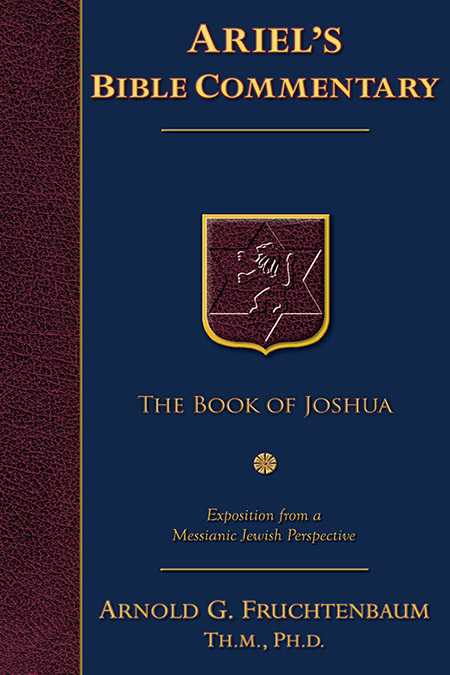
Commentary Series: The Book of Joshua
by Dr. Arnold G. Fruchtenbaum
The book of Joshua was written to document the Israelites' conquest of the Promised Land. It picks up the history of the Jewish people where Deuteronomy left off and covers the time period from the conquest to the settlement, from Moses to Judges. The book of Joshua does not merely trace the acts of one man or the history of a people, but it also shows how after the death of Moses, the faithful, covenant-keeping God fulfilled for Israel the promises made to the patriarchs.
The author details the rapidly moving historical narrative of Joshua and comments on it from a Messianic Jewish perspective. His work is replete with visual aids for the reader, such as maps, charts, and tables. The result is a handy, up-to-date commentary on a fascinating period in the history of the Jewish people.
- Hardcover: 329 pages
- ISBN: 978-1-951059-80-4
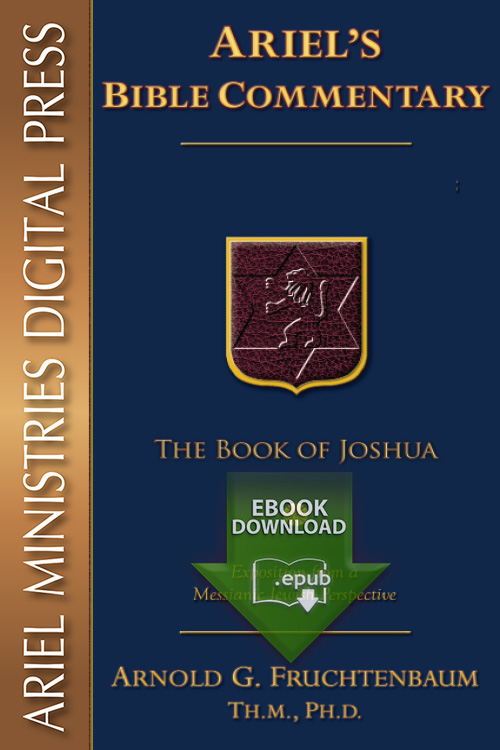
Commentary Series: The Book of Joshua (epub)
by Dr. Arnold G. Fruchtenbaum
The book of Joshua was written to document the Israelites' conquest of the Promised Land. It picks up the history of the Jewish people where Deuteronomy left off and covers the time period from the conquest to the settlement, from Moses to Judges. The book of Joshua does not merely trace the acts of one man or the history of a people, but it also shows how after the death of Moses, the faithful, covenant-keeping God fulfilled for Israel the promises made to the patriarchs.
The author details the rapidly moving historical narrative of Joshua and comments on it from a Messianic Jewish perspective. His work is replete with visual aids for the reader, such as maps, charts, and tables. The result is a handy, up-to-date commentary on a fascinating period in the history of the Jewish people..
- Ebook for Kindle and Epub readers
- 329 pages
- Approximate download file size is 6.5 MB
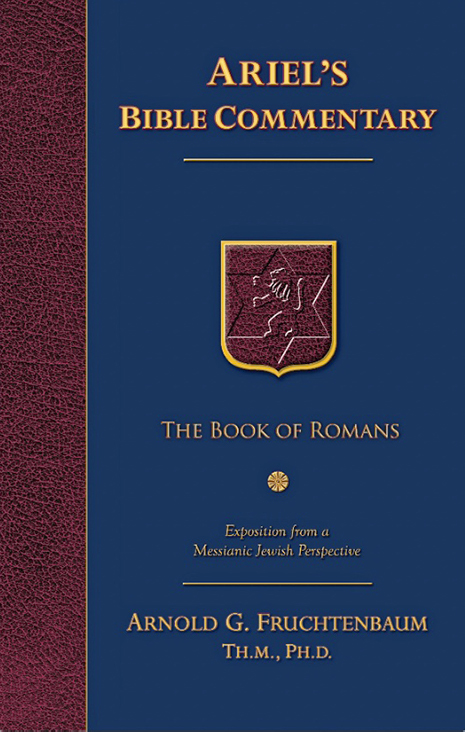
Commentary Series: The Book of Romans
by Dr. Arnold Fruchtenbaum
The epistle to the Romans is unique, being the first time in history that theology had been systematized in written form. The first eight chapters in Paul’s theological treatise deal with the theology of God’s righteousness. No human being can meet God’s standards of righteousness, yet He has provided righteousness through salvation in Yeshua the Messiah, which includes justification, sanctification, and glorification. Thus, the chapters end with Paul’s assurance that absolutely nothing can separate believers from the love of God.
Before going on to apply these truths to the believer’s life (chapters 12-16), Paul first addresses God’s righteousness in His relationship with Israel (chapters 9-11), for at the end of chapter 8, the believer might wonder what was to become of God’s many promises to Israel that had been laid out in the Hebrew Bible. Israel today is largely a people in a state of unbelief. It does not appear that God’s promises to His people were kept in Paul’s day, let alone two thousand years later. If this was or is true of Israel, how can the believer today trust that there is indeed nothing that can separate him from the love of God? If the gospel is for the Jews first, as Paul writes in Romans 1:16, why are so few Jews saved? How do Gentiles know they can trust God if His promises to Israel have not been fulfilled?
In this commentary, Dr. Arnold G. Fruchtenbaum addresses these and other critical issues whose proper understanding can truly revolutionize any believer’s walk with the Lord. The author is the foremost Messianic Jewish scholar of this generation and is therefore well qualified to discuss the Jewish context of the epistle to the Romans. As a dispensational theologian, he offers his readers a truly unique commentary that draws them closer to the God of Abraham, Isaac, and Jacob.
- Hardcover: 408 pages
- Dimensions: 6" x 9"
- ISBN: 978-1-951-059-94-1





